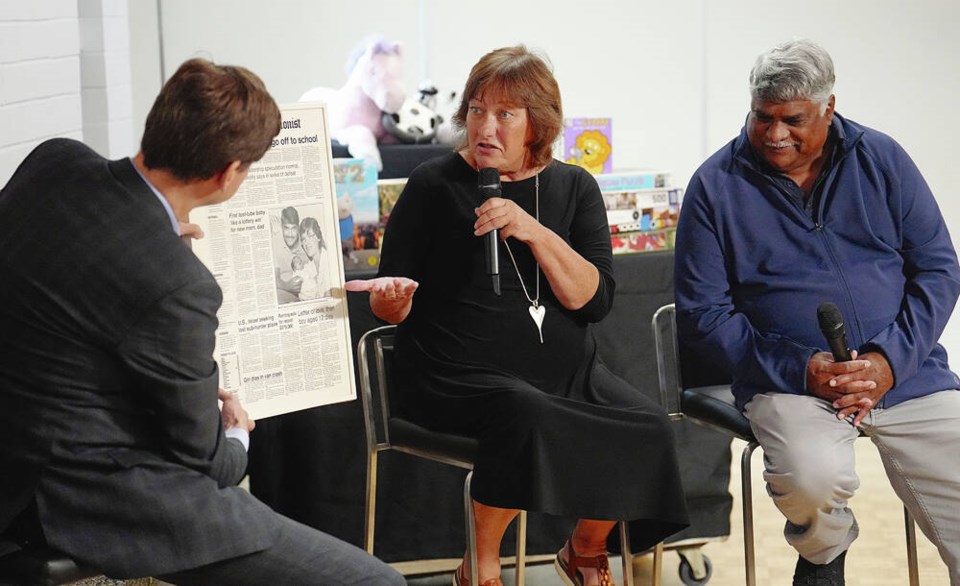B.C. NDP Leader David Eby highlighted his government’s pledge to fund in vitro fertilization at an event Tuesday with Vancouver Island’s first couple to have a “test-tube baby” almost four decades ago, and a couple trying to conceive today.
In 1986, when Lia and Viva Moodley appeared on the front page of the Times Colonist, the new parents compared the birth of daughter Marielle at Victoria General Hospital to “a lottery win.”
“We were extremely lucky — we got pregnant the first time,” Lia said. “She was like winning the lottery.”
But it came with a financial cost: The procedure took 12 years to pay off, and Viva, a teacher, had to forgo getting his master’s degree.
“It was extremely expensive — it was hard to even fathom that we could get that money together,” said Lia, who was a civil servant, and notes the couple didn’t have the collateral for a loan.
“We applied for different credit cards to have enough credit cards available to make it through financially,” she said.
Since then, Marielle, now 37, has had two children of her own and works for the provincial government.
In the intervening decades, IVF treatments have advanced greatly, but couples may still try several times without success, and the cost — typically ranging from about $15,000 to $20,000 per cycle — remains prohibitive for many would-be parents.
Desiree Cabecinha, 37, who is preparing to begin IVF to start a family with partner Teri Parker, 38, said that to afford the treatments — $11,000 for the donor sperm on top of $20,000 in IVF treatments — the couple has downsized to a condo from a townhome and is “indefinitely” postponing their wedding.
Parker, however, may be able to take advantage of a publicly funded IVF round next year, which the couple says would have a “huge” impact on their ability to save money to raise children.
Starting April 1, 2025, B.C. will join other provinces, including Ontario, Manitoba and Quebec, in funding an initial IVF treatment for those struggling with infertility or other challenges to having a child. In the budget in February, the province allocated $68 million over three years to help families have babies.
“You shouldn’t have to borrow or spend tens of thousands of dollars to access IVF to have a child,” said Eby.
B.C. is the first province to make birth control free for women — prescriptions are available through a pharmacist for those without a family doctor — as well as emergency contraceptive Plan B.
The subject of reproductive rights came up at a campaign rally B.C. Conservative leader John Rustad held in Cobble Hill on Saturday. A woman in the audience asked about Rustad’s view on abortion.
“Let me start by saying this, children are a blessing,” said Rustad, explaining he and wife Kim were unable to have children due to her cervical cancer.
Rustad added, however, that the issue of abortion comes under federal jurisdiction. “And as the Conservative Party of British Columbia, we’re not going to reopen this debate.”
Asked about his opponent’s response, Eby noted that health care is provided by the provinces.
“So when I hear a leadership candidate say it’s a federal issue, what he’s really saying is: ‘I don’t want to tell you what my position is, and I’m going to be the premier and making decisions about where those health-care dollars go,’ ” said Eby.
“Will that leader fund free birth control? Probably not. Will that leader fund the morning-after pill for free? Probably not. Will that leader ensure that access to abortion is provided across the province where women need that service? Probably not.”
But Rustad insisted Tuesday that he has no plans to change anything when it comes to access to abortion and contraception. “Under a BC Conservative government, access to abortion, contraception and other items will remain exactly as it is now,” he said. “There will be no changes.”
In May, B.C. Greens leader Sonia Furstenau, MLA for Cowichan Valley, called on provincial leaders to affirm their support for reproductive rights in B.C., especially in light of “disturbing restrictions to abortion access in the United States.”
“As a province, we must stand together in support of women’s health care, including access to all forms of reproductive care,” said Furstenau.
Furstenau also pointed to significant disparities in access to reproductive health care, noting the vast majority of surgical abortion facilities are concentrated in the southern region of the province, “leaving those in northern, rural, and remote areas facing substantial barriers.”
The nearest clinic to Haida Gwaii is 1,700 kilometres away, 26 hours’ travel time, she said. Surrey, Prince George, Courtenay, and Kamloops have no publicly listed abortion providers.



